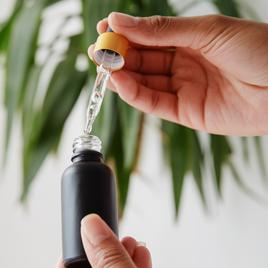Vitamin C is also safe to use in conjunction with other skin care actives, including alpha hydroxy acids, retinols, and SPF.

Vitamin C Skincare
Share
What’s a vitamin C serum?
If you have your head in the skin care game, you’ve likely heard of vitamin C serums.
Vitamin C is touted as one of the best anti-aging ingredients on the market — and the key to maintaining a smooth, even, and glowy complexion.
Although you’re probably getting vitamin C in your diet, there’s no way to guarantee that it’s going straight to your skin. Using serums and other topical products is the most direct way to reap these benefits.
Read on to learn why you should add vitamin C serum to your routine, how to introduce a new product, and more.
1. It’s safe for most skin types
Vitamin C has an excellent safety profile. Most people can use topical vitamin C for an extended period of time without experiencing any adverse reactions.
In rare cases, people who have hypersensitive skin may experience minor irritation.
2. It’s hydrating
Magnesium ascorbyl phosphate, one of the main vitamin C derivatives used in skin care, has been shown to have a hydrating effect on skin. It decreases transepidermal water loss, allowing your skin to better retain moisture.
3. It’s brightening
Vitamin C can help fade pigmentation (more on this below!) and smooth the skin’s surface to reduce dullness. This gives skin a youthful glow.
4. It helps reduce redness and even out your skin tone
Vitamin C has also been shown to treat a huge variety of inflammatory skin conditions. Minimizing redness can create a more even complexion.
5. It helps fade hyperpigmentation
Hyperpigmentation — including sun spots, age spots, and melasma — occurs when melanin is overproduced in certain areas of the skin. It can also happen in areas where acne has healed.
Vitamin C application has been shown to impede melanin production. This can help fade dark spots and lead to a more even-toned complexion.
6. It reduces the appearance of under-eye circles
These serums can help smooth out fine lines by plumping and hydrating the under-eye area.
Although vitamin C is more effective at reducing overall redness, some people say that it can help alleviate discoloration associated with under-eye circles.
7. It promotes collagen production
Collagen is a naturally occurring protein that depletes over time. Lower levels of collagen can lead to fine lines and wrinkles.
8. It may help prevent skin sagging
Collagen production is tied to skin elasticity and firmness. When your collagen levels begin to drop, your skin may begin to sag.
Applying a vitamin C serum may boost collagen production, resulting in an overall tightening effect.
9. It protects against sun damage
Sun damage is caused by molecules called free radicals. These are atoms with a missing electron. other atoms from which they can “steal” an electron —and this can lead to significant damage to the skin.
Vitamin C is rich in antioxidants. Antioxidants protect healthy skin cells by “giving” these free radicals an electron, rendering them harmless.
10. It may help soothe sunburns
In addition to minimizing redness, vitamin C accelerates cell turnover. This replaces the damaged cells with healthy new ones.
11. And it generally helps boost wound healing
Given its effects on sunburn, it should be no surprise that vitamin C application can speed up overall wound healing. Healthy wound healing reduces your risk for inflammation, infection, and scarring.
The bottom line
Vitamin C can help heal blemishes, reduce hyperpigmentation, and give your skin an out-of-this-world glow.
Consistency is key for maximum effect, so add it to your routine in a way that makes sense for you. Some people apply it in the morning to take advantage of its UV-protectant properties, while others find that it works best as a night serum.
Discontinue use if you begin to experience irritation or discomfort.
Last medically reviewed on August 24, 2018
